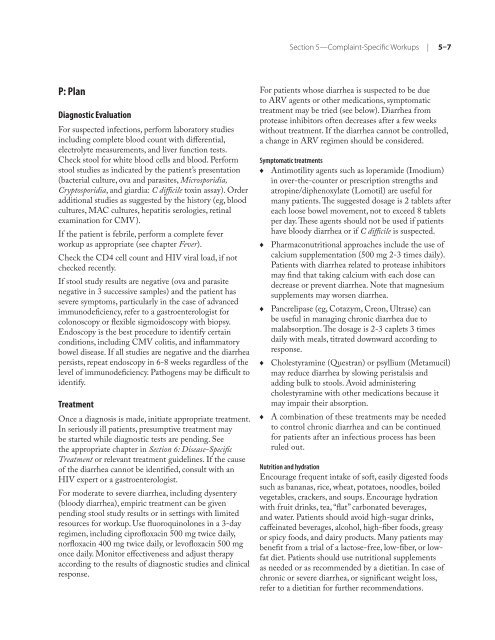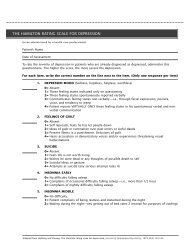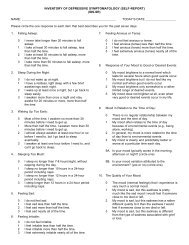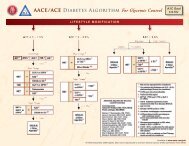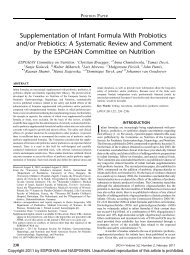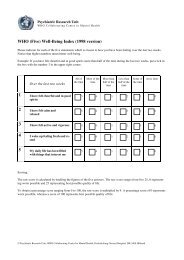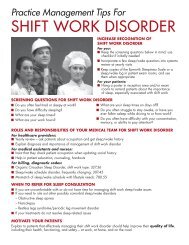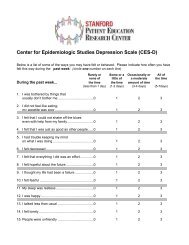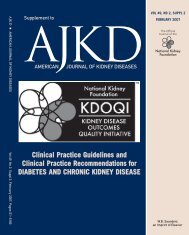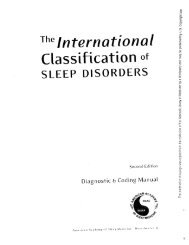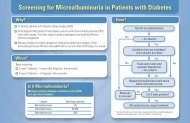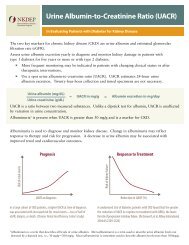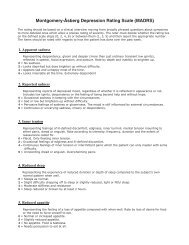Clinical Manual for Management of the HIV-Infected ... - myCME.com
Clinical Manual for Management of the HIV-Infected ... - myCME.com
Clinical Manual for Management of the HIV-Infected ... - myCME.com
Create successful ePaper yourself
Turn your PDF publications into a flip-book with our unique Google optimized e-Paper software.
P: Plan<br />
Diagnostic Evaluation<br />
For suspected infections, per<strong>for</strong>m laboratory studies<br />
including <strong>com</strong>plete blood count with differential,<br />
electrolyte measurements, and liver function tests.<br />
Check stool <strong>for</strong> white blood cells and blood. Per<strong>for</strong>m<br />
stool studies as indicated by <strong>the</strong> patient’s presentation<br />
(bacterial culture, ova and parasites, Microsporidia,<br />
Cryptosporidia, and giardia: C difficile toxin assay). Order<br />
additional studies as suggested by <strong>the</strong> history (eg, blood<br />
cultures, MAC cultures, hepatitis serologies, retinal<br />
examination <strong>for</strong> CMV).<br />
If <strong>the</strong> patient is febrile, per<strong>for</strong>m a <strong>com</strong>plete fever<br />
workup as appropriate (see chapter Fever).<br />
Check <strong>the</strong> CD4 cell count and <strong>HIV</strong> viral load, if not<br />
checked recently.<br />
If stool study results are negative (ova and parasite<br />
negative in 3 successive samples) and <strong>the</strong> patient has<br />
severe symptoms, particularly in <strong>the</strong> case <strong>of</strong> advanced<br />
immunodeficiency, refer to a gastroenterologist <strong>for</strong><br />
colonoscopy or flexible sigmoidoscopy with biopsy.<br />
Endoscopy is <strong>the</strong> best procedure to identify certain<br />
conditions, including CMV colitis, and inflammatory<br />
bowel disease. If all studies are negative and <strong>the</strong> diarrhea<br />
persists, repeat endoscopy in 6-8 weeks regardless <strong>of</strong> <strong>the</strong><br />
level <strong>of</strong> immunodeficiency. Pathogens may be difficult to<br />
identify.<br />
Treatment<br />
Once a diagnosis is made, initiate appropriate treatment.<br />
In seriously ill patients, presumptive treatment may<br />
be started while diagnostic tests are pending. See<br />
<strong>the</strong> appropriate chapter in Section 6: Disease-Specific<br />
Treatment or relevant treatment guidelines. If <strong>the</strong> cause<br />
<strong>of</strong> <strong>the</strong> diarrhea cannot be identified, consult with an<br />
<strong>HIV</strong> expert or a gastroenterologist.<br />
For moderate to severe diarrhea, including dysentery<br />
(bloody diarrhea), empiric treatment can be given<br />
pending stool study results or in settings with limited<br />
resources <strong>for</strong> workup. Use fluoroquinolones in a 3-day<br />
regimen, including cipr<strong>of</strong>loxacin 500 mg twice daily,<br />
norfloxacin 400 mg twice daily, or lev<strong>of</strong>loxacin 500 mg<br />
once daily. Monitor effectiveness and adjust <strong>the</strong>rapy<br />
according to <strong>the</strong> results <strong>of</strong> diagnostic studies and clinical<br />
response.<br />
Section 5—Complaint-Specific Workups | 5–7<br />
For patients whose diarrhea is suspected to be due<br />
to ARV agents or o<strong>the</strong>r medications, symptomatic<br />
treatment may be tried (see below). Diarrhea from<br />
protease inhibitors <strong>of</strong>ten decreases after a few weeks<br />
without treatment. If <strong>the</strong> diarrhea cannot be controlled,<br />
a change in ARV regimen should be considered.<br />
Symptomatic treatments<br />
♦ Antimotility agents such as loperamide (Imodium)<br />
in over-<strong>the</strong>-counter or prescription strengths and<br />
atropine/diphenoxylate (Lomotil) are useful <strong>for</strong><br />
many patients. The suggested dosage is 2 tablets after<br />
each loose bowel movement, not to exceed 8 tablets<br />
per day. These agents should not be used if patients<br />
have bloody diarrhea or if C difficile is suspected.<br />
♦<br />
♦<br />
♦<br />
♦<br />
Pharmaconutritional approaches include <strong>the</strong> use <strong>of</strong><br />
calcium supplementation (500 mg 2-3 times daily).<br />
Patients with diarrhea related to protease inhibitors<br />
may find that taking calcium with each dose can<br />
decrease or prevent diarrhea. Note that magnesium<br />
supplements may worsen diarrhea.<br />
Pancrelipase (eg, Cotazym, Creon, Ultrase) can<br />
be useful in managing chronic diarrhea due to<br />
malabsorption. The dosage is 2-3 caplets 3 times<br />
daily with meals, titrated downward according to<br />
response.<br />
Cholestyramine (Questran) or psyllium (Metamucil)<br />
may reduce diarrhea by slowing peristalsis and<br />
adding bulk to stools. Avoid administering<br />
cholestyramine with o<strong>the</strong>r medications because it<br />
may impair <strong>the</strong>ir absorption.<br />
A <strong>com</strong>bination <strong>of</strong> <strong>the</strong>se treatments may be needed<br />
to control chronic diarrhea and can be continued<br />
<strong>for</strong> patients after an infectious process has been<br />
ruled out.<br />
Nutrition and hydration<br />
Encourage frequent intake <strong>of</strong> s<strong>of</strong>t, easily digested foods<br />
such as bananas, rice, wheat, potatoes, noodles, boiled<br />
vegetables, crackers, and soups. Encourage hydration<br />
with fruit drinks, tea, “flat” carbonated beverages,<br />
and water. Patients should avoid high-sugar drinks,<br />
caffeinated beverages, alcohol, high-fiber foods, greasy<br />
or spicy foods, and dairy products. Many patients may<br />
benefit from a trial <strong>of</strong> a lactose-free, low-fiber, or lowfat<br />
diet. Patients should use nutritional supplements<br />
as needed or as re<strong>com</strong>mended by a dietitian. In case <strong>of</strong><br />
chronic or severe diarrhea, or significant weight loss,<br />
refer to a dietitian <strong>for</strong> fur<strong>the</strong>r re<strong>com</strong>mendations.


